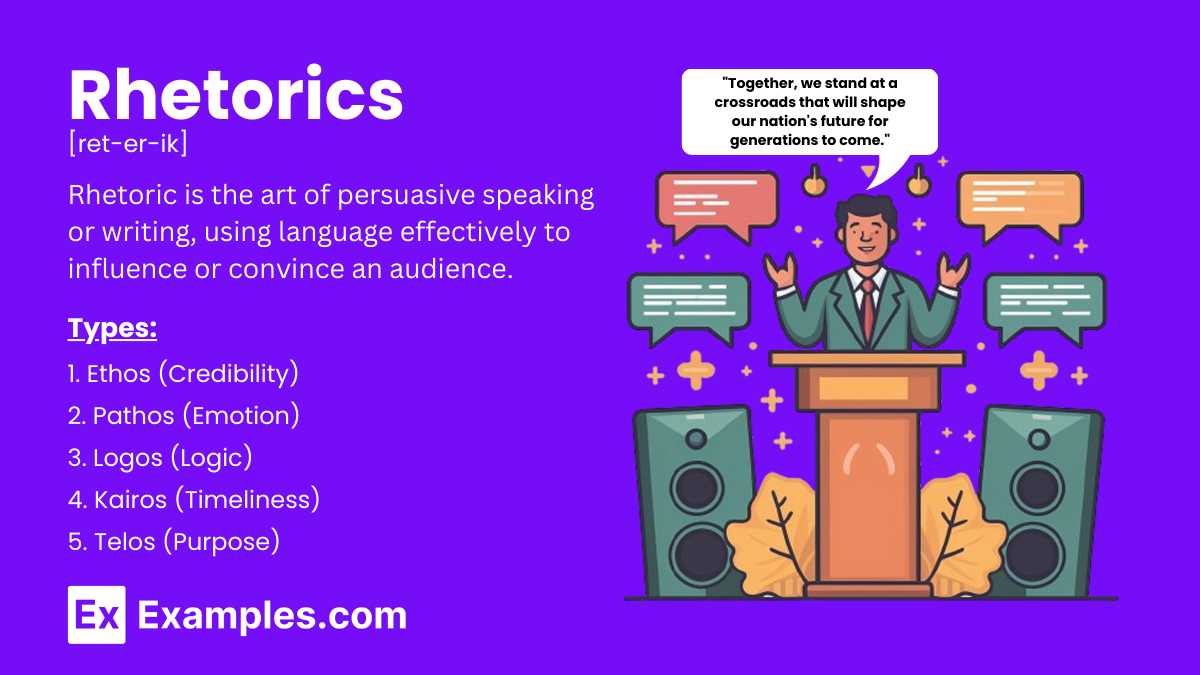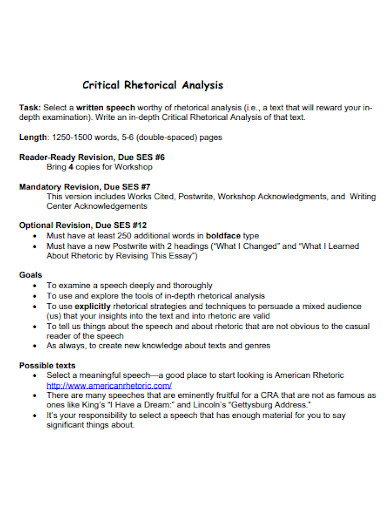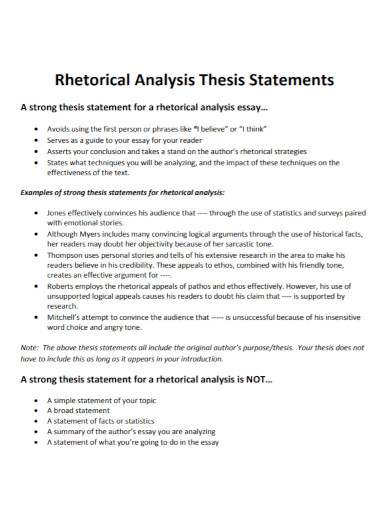90+ Rhetorics Examples
Rhetoric, a term often associated with the art of persuasion, has been a cornerstone of communication since the time of ancient Greece. It is a powerful tool that, when used effectively, can influence, inspire, and inform. This article will delve into the concept of rhetoric, its application, and its various forms, providing a comprehensive guide on how to use rhetoric effectively.
What is a Rhetoric?
Rhetoric is the art of effective or persuasive speaking or writing, often employing specific figures of speech and other compositional techniques. It involves the strategic use of language to achieve a desired effect or response from an audience. Rhetoric can be found in a variety of forms, from speeches and essays to advertisements and political campaigns. It encompasses a wide range of rhetorical devices, including rhetorical questions, alliteration, analogies, and more.
Types of Rhetorics
Rhetoric is the art of persuasive speaking or writing. It involves using language effectively to influence or persuade an audience. Understanding different types of rhetoric is essential for analyzing and crafting effective arguments. Here are the main types:
1. Ethos (Ethical Appeal)
Ethos involves establishing the credibility or character of the speaker or writer. It’s about convincing the audience of the trustworthiness and authority of the speaker.
- Techniques:
- Using expert opinions and credentials.
- Demonstrating knowledge and expertise.
- Establishing a moral high ground.
- Examples:
- A doctor writing about health issues.
- A respected scientist discussing climate change.
2. Pathos (Emotional Appeal)
Pathos aims to evoke emotions in the audience to persuade them. This type of rhetoric appeals to the audience’s feelings and values.
- Techniques:
- Using vivid and emotional language.
- Telling compelling stories.
- Creating empathy or fear.
- Examples:
- A charity advertisement showing images of people in need.
- A political speech appealing to patriotism.
3. Logos (Logical Appeal)
Logos is based on logic and reason. It involves using facts, statistics, and logical arguments to persuade the audience.
- Techniques:
- Providing clear and rational arguments.
- Using data and evidence.
- Making logical connections.
- Examples:
- A research paper presenting data and findings.
- A business proposal with detailed financial projections.
4. Kairos (Timeliness)
Kairos refers to the timeliness and appropriateness of the message. It emphasizes the right moment to deliver a message for maximum impact.
- Techniques:
- Delivering a message at a crucial moment.
- Creating a sense of urgency.
- Using current events to make a point.
- Examples:
- A speech about environmental conservation delivered on Earth Day.
- A marketing campaign launched during a major holiday.
5. Telos (Purpose)
Telos relates to the purpose or ultimate goal of the rhetoric. It focuses on the intended outcome of the message.
- Techniques:
- Clearly stating the goal or purpose.
- Aligning the message with the audience’s needs and values.
- Ensuring that every part of the message supports the ultimate goal.
- Examples:
- A motivational speech aimed at inspiring action.
- A persuasive essay with a clear call to action.
Examples of Rhetorics:
Rhetoric Examples Sentences
Here are some examples of sentences employing various rhetorical devices:
1. Anaphora
- “Every day, every night, in every way, I am getting better and better.”
2. Antithesis
- “It was the best of times, it was the worst of times.”
3. Hyperbole
- “I’ve told you a million times not to exaggerate.”
4. Metaphor
- “The world is a stage, and we are merely players.”
5. Simile
- “Her smile was as bright as the sun.”
6. Alliteration
- “She sells seashells by the seashore.”
7. Irony
- “Oh great! Now I have to walk all the way home because I missed the bus.”
8. Euphemism
- “He passed away” instead of “He died.”
9. Oxymoron
- “Bittersweet memories filled her heart.”
10. Parallelism
- “Like father, like son.”
11. Understatement
- “It’s just a scratch,” he said, as blood poured from the wound.
12. Personification
- “The wind whispered through the trees.”
13. Rhetorical Question
- “Isn’t it a bit late to start studying now?”
14. Chiasmus
- “Ask not what your country can do for you, but what you can do for your country.”
15. Synecdoche
- “All hands on deck” (meaning all people on deck).
Rhetoric Examples in Literature
1. Ethos (Credibility)
Example from “Letter from Birmingham Jail” by Martin Luther King Jr.:
- Quote: “I have the honor of serving as president of the Southern Christian Leadership Conference…”
- Explanation: King establishes his credibility by mentioning his leadership role in a respected organization.
2. Pathos (Emotion)
Example from “Charlotte’s Web” by E.B. White:
- Quote: “Wilbur didn’t want food, he wanted love.”
- Explanation: The appeal to emotion here makes readers empathize with Wilbur, the pig, and his desire for affection.
3. Logos (Logic)
Example from “Silent Spring” by Rachel Carson:
- Quote: “In 1958, the National Cancer Institute and the U.S. Public Health Service undertook a cooperative study of the relationship between cancer and pesticides…”
- Explanation: Carson uses scientific data to logically argue against the use of harmful pesticides.
4. Anaphora (Repetition)
Example from “I Have a Dream” by Martin Luther King Jr.:
- Quote: “I have a dream that one day this nation will rise up… I have a dream that one day on the red hills of Georgia…”
- Explanation: The repeated phrase “I have a dream” emphasizes King’s vision for a better future.
5. Alliteration (Repetition of Initial Consonant Sounds)
Example from “To Kill a Mockingbird” by Harper Lee:
- Quote: “The tired, old town.”
- Explanation: The repetition of the ‘t’ sound creates a rhythm and emphasizes the description of the town.
6. Antithesis (Contrasting Ideas)
Example from “A Tale of Two Cities” by Charles Dickens:
- Quote: “It was the best of times, it was the worst of times…”
- Explanation: Dickens uses antithesis to highlight the contradictions of the era.
7. Metaphor (Comparison Without “Like” or “As”)
Example from “Romeo and Juliet” by William Shakespeare:
- Quote: “But, soft! what light through yonder window breaks? It is the east, and Juliet is the sun.”
- Explanation: Shakespeare compares Juliet to the sun, suggesting her brightness and importance.
8. Simile (Comparison Using “Like” or “As”)
Example from “The Old Man and the Sea” by Ernest Hemingway:
- Quote: “The clouds over the land now rose like mountains…”
- Explanation: Hemingway compares clouds to mountains, creating a vivid image.
9. Hyperbole (Exaggeration)
Example from “The Adventures of Pinocchio” by Carlo Collodi:
- Quote: “His nose grew longer and longer.”
- Explanation: The exaggerated growth of Pinocchio’s nose underscores his dishonesty.
10. Rhetorical Question (Question Asked for Effect)
Example from “Ode to the West Wind” by Percy Bysshe Shelley:
- Quote: “O Wind, If Winter comes, can Spring be far behind?”
- Explanation: Shelley uses a rhetorical question to provoke thought and emphasize the cyclical nature of seasons.
Rhetoric Examples in Writing
Rhetoric enhances writing by making it more persuasive and engaging. Here are examples of rhetorical techniques used in various forms of writing:
1. Ethos (Credibility)
- Sentence: “As a renowned psychologist with over 20 years of experience, I can assure you that these findings are accurate.”
- Explanation: Establishes the author’s credibility and authority on the subject.
2. Pathos (Emotion)
- Sentence: “Imagine the heartbreak of a child who goes to bed hungry every night.”
- Explanation: Appeals to the reader’s emotions, evoking empathy and concern.
3. Logos (Logic)
- Sentence: “According to a recent study, 70% of high school graduates go on to attend college.”
- Explanation: Uses logical evidence and statistics to support the argument.
4. Anaphora (Repetition)
- Sentence: “We will fight for justice. We will fight for equality. We will fight for our children’s future.”
- Explanation: Repeats the phrase “We will fight” to emphasize determination and unity.
5. Alliteration (Repetition of Initial Consonant Sounds)
- Sentence: “Sally sells seashells by the seashore.”
- Explanation: Repeats the initial ‘s’ sound to create a rhythmic and memorable phrase.
6. Antithesis (Contrasting Ideas)
- Sentence: “It was the best of times, it was the worst of times.”
- Explanation: Contrasts two opposite ideas to highlight the extremes of the situation.
7. Metaphor (Comparison Without “Like” or “As”)
- Sentence: “Time is a thief that steals our moments.”
- Explanation: Compares time to a thief, suggesting it takes away valuable moments.
8. Simile (Comparison Using “Like” or “As”)
- Sentence: “Her smile was as bright as the sun.”
- Explanation: Uses “as” to compare her smile to the brightness of the sun.
9. Hyperbole (Exaggeration)
- Sentence: “I’ve told you a million times to clean your room!”
- Explanation: Exaggerates to emphasize the speaker’s frustration.
10. Rhetorical Question (Question Asked for Effect)
- Sentence: “Isn’t it time we took a stand against injustice?”
- Explanation: Asks a question to provoke thought and emphasize the need for action without expecting an answer.
Rhetoric Examples in Everyday Life
Rhetoric is not just limited to literature or speeches; it is used in everyday life to persuade, inform, and engage others. Here are examples of rhetorical techniques in various common situations:
1. Ethos (Credibility)
- Sentence: “As a parent, I understand the importance of safety for our children.”
- Explanation: Establishes credibility by sharing a common role or experience with the audience.
2. Pathos (Emotion)
- Sentence: “Think about the joy on your family’s faces when they see this beautiful holiday meal.”
- Explanation: Appeals to the audience’s emotions by evoking feelings of joy and togetherness.
3. Logos (Logic)
- Sentence: “If we recycle more, we can reduce landfill waste by 25%.”
- Explanation: Uses logical reasoning and statistics to support the argument.
4. Anaphora (Repetition)
- Sentence: “Every day, every night, in every way, I am getting better and better.”
- Explanation: Repeats the phrase “every” to create emphasis and a sense of progression.
5. Alliteration (Repetition of Initial Consonant Sounds)
- Sentence: “Peter Piper picked a peck of pickled peppers.”
- Explanation: Uses repetition of the ‘p’ sound to create a catchy and memorable phrase.
6. Antithesis (Contrasting Ideas)
- Sentence: “You’re easy on the eyes, but hard on the heart.”
- Explanation: Contrasts two opposing ideas to highlight the complexity of a situation.
7. Metaphor (Comparison Without “Like” or “As”)
- Sentence: “This investment is a goldmine.”
- Explanation: Compares the investment to a goldmine, suggesting it is very profitable.
8. Simile (Comparison Using “Like” or “As”)
- Sentence: “He’s as busy as a bee.”
- Explanation: Uses “as” to compare someone’s busyness to a bee’s activity.
9. Hyperbole (Exaggeration)
- Sentence: “I’m so hungry I could eat a horse.”
- Explanation: Exaggerates to emphasize extreme hunger.
10. Rhetorical Question (Question Asked for Effect)
- Sentence: “Isn’t it obvious that we need to take action now?”
- Explanation: Asks a question to provoke thought and highlight the urgency without expecting an answer.
Rhetoric Examples in History
Rhetoric has played a crucial role in shaping historical events and public opinion. Here are examples of rhetorical techniques used by influential figures throughout history:
1. Ethos (Credibility)
Martin Luther King Jr. – “I Have a Dream” Speech
- Sentence: “I am happy to join with you today in what will go down in history as the greatest demonstration for freedom in the history of our nation.”
- Explanation: King establishes his credibility as a leader in the civil rights movement by addressing a historic gathering.
2. Pathos (Emotion)
Winston Churchill – “We Shall Fight on the Beaches” Speech
- Sentence: “We shall fight on the beaches, we shall fight on the landing grounds, we shall fight in the fields and in the streets, we shall fight in the hills; we shall never surrender.”
- Explanation: Churchill evokes strong emotions of determination and resilience during World War II.
3. Logos (Logic)
Abraham Lincoln – Gettysburg Address
- Sentence: “Four score and seven years ago our fathers brought forth on this continent, a new nation, conceived in Liberty, and dedicated to the proposition that all men are created equal.”
- Explanation: Lincoln uses historical context and logical progression to reinforce the principles of equality and freedom.
4. Anaphora (Repetition)
Franklin D. Roosevelt – First Inaugural Address
- Sentence: “The only thing we have to fear is fear itself.”
- Explanation: Roosevelt repeats the concept of fear to emphasize its paralyzing effect on progress.
5. Alliteration (Repetition of Initial Consonant Sounds)
John F. Kennedy – Inaugural Address
- Sentence: “Let us go forth to lead the land we love…”
- Explanation: The repetition of the ‘l’ sound creates a rhythmic and memorable phrase.
6. Antithesis (Contrasting Ideas)
Neil Armstrong – Moon Landing
- Sentence: “That’s one small step for man, one giant leap for mankind.”
- Explanation: Contrasts the small physical step with the enormous significance of the achievement.
7. Metaphor (Comparison Without “Like” or “As”)
Ronald Reagan – Challenger Disaster Speech
- Sentence: “The crew of the space shuttle Challenger honored us by the manner in which they lived their lives.”
- Explanation: Reagan compares the astronauts’ lives to a form of honor, elevating their sacrifice.
8. Simile (Comparison Using “Like” or “As”)
Mahatma Gandhi – Speech on Non-Violence
- Sentence: “Non-violence is the greatest force at the disposal of mankind. It is mightier than the mightiest weapon of destruction devised by the ingenuity of man.”
- Explanation: Gandhi compares non-violence to a mighty force, highlighting its power.
9. Hyperbole (Exaggeration)
Patrick Henry – “Give Me Liberty or Give Me Death” Speech
- Sentence: “I know not what course others may take; but as for me, give me liberty or give me death!”
- Explanation: Henry uses hyperbole to emphasize his commitment to freedom at any cost.
10. Rhetorical Question (Question Asked for Effect)
Socrates – Apology
- Sentence: “Is there not here conceit of knowledge, which is a disgraceful sort of ignorance?”
- Explanation: Socrates asks questions to provoke critical thinking and highlight the flaws in his accusers’ logic.
Rhetoric Speech Examples
Rhetoric has been used effectively in speeches throughout history to persuade, inspire, and mobilize audiences. Here are notable examples of rhetorical techniques used in famous speeches:
1. Ethos (Credibility)
Martin Luther King Jr. – “I Have a Dream” Speech
- Quote: “I am happy to join with you today in what will go down in history as the greatest demonstration for freedom in the history of our nation.”
- Explanation: King establishes his credibility as a civil rights leader by addressing a significant historical event.
2. Pathos (Emotion)
Winston Churchill – “We Shall Fight on the Beaches” Speech
- Quote: “We shall fight on the beaches, we shall fight on the landing grounds, we shall fight in the fields and in the streets, we shall fight in the hills; we shall never surrender.”
- Explanation: Churchill evokes strong emotions of determination and resilience during World War II.
3. Logos (Logic)
Abraham Lincoln – Gettysburg Address
- Quote: “Four score and seven years ago our fathers brought forth on this continent, a new nation, conceived in Liberty, and dedicated to the proposition that all men are created equal.”
- Explanation: Lincoln uses historical context and logical progression to reinforce the principles of equality and freedom.
4. Anaphora (Repetition)
Martin Luther King Jr. – “I Have a Dream” Speech
- Quote: “I have a dream that one day this nation will rise up and live out the true meaning of its creed: ‘We hold these truths to be self-evident, that all men are created equal.'”
- Explanation: The repeated phrase “I have a dream” emphasizes King’s vision for a better future.
5. Alliteration (Repetition of Initial Consonant Sounds)
John F. Kennedy – Inaugural Address
- Quote: “Let us go forth to lead the land we love…”
- Explanation: The repetition of the ‘l’ sound creates a rhythmic and memorable phrase.
6. Antithesis (Contrasting Ideas)
Neil Armstrong – Moon Landing
- Quote: “That’s one small step for man, one giant leap for mankind.”
- Explanation: Contrasts the small physical step with the enormous significance of the achievement.
7. Metaphor (Comparison Without “Like” or “As”)
Ronald Reagan – Challenger Disaster Speech
- Quote: “The crew of the space shuttle Challenger honored us by the manner in which they lived their lives.”
- Explanation: Reagan compares the astronauts’ lives to a form of honor, elevating their sacrifice.
8. Simile (Comparison Using “Like” or “As”)
Mahatma Gandhi – Speech on Non-Violence
- Quote: “Non-violence is the greatest force at the disposal of mankind. It is mightier than the mightiest weapon of destruction devised by the ingenuity of man.”
- Explanation: Gandhi compares non-violence to a mighty force, highlighting its power.
9. Hyperbole (Exaggeration)
Patrick Henry – “Give Me Liberty or Give Me Death” Speech
- Quote: “I know not what course others may take; but as for me, give me liberty or give me death!”
- Explanation: Henry uses hyperbole to emphasize his commitment to freedom at any cost.
10. Rhetorical Question (Question Asked for Effect)
Socrates – Apology
- Quote: “Is there not here conceit of knowledge, which is a disgraceful sort of ignorance?”
- Explanation: Socrates asks questions to provoke critical thinking and highlight the flaws in his accusers’ logic.
Examples of Rhetoric in Media
Rhetoric is widely used in media to persuade, inform, and entertain audiences. Here are some notable examples of rhetorical techniques employed in various forms of media:
1. Ethos (Credibility)
News Anchor on a Trusted News Network
- Sentence: “As a journalist with over 30 years of experience, I can confirm that this information comes from reliable sources.”
- Explanation: Establishes the news anchor’s credibility by highlighting their extensive experience and trusted sources.
2. Pathos (Emotion)
Charity Advertisement
- Sentence: “Every day, thousands of children go to bed hungry. You can make a difference with just a small donation.”
- Explanation: Appeals to the audience’s emotions by highlighting the plight of hungry children and urging action.
3. Logos (Logic)
Documentary on Climate Change
- Sentence: “According to NASA, 97% of actively publishing climate scientists agree that climate-warming trends over the past century are extremely likely due to human activities.”
- Explanation: Uses statistical data and credible sources to support the argument about climate change.
4. Anaphora (Repetition)
Political Speech
- Sentence: “We need change. We need action. We need leadership that listens to the people.”
- Explanation: Repeats the phrase “We need” to emphasize the urgency and importance of the speaker’s message.
5. Alliteration (Repetition of Initial Consonant Sounds)
Advertisement for a New Product
- Sentence: “Sleek, stylish, and sophisticated—the new smartphone from XYZ Company.”
- Explanation: Uses alliteration with the ‘s’ sound to create a catchy and memorable description of the product.
6. Antithesis (Contrasting Ideas)
Opinion Editorial
- Sentence: “We must learn to live together as brothers or perish together as fools.”
- Explanation: Contrasts living together with perishing to highlight the importance of unity.
7. Metaphor (Comparison Without “Like” or “As”)
Headline in a Newspaper
- Sentence: “The new policy is a double-edged sword.”
- Explanation: Compares the policy to a double-edged sword, suggesting it has both positive and negative consequences.
8. Simile (Comparison Using “Like” or “As”)
Movie Review
- Sentence: “The plot unfolds like a delicate flower, revealing new layers with each scene.”
- Explanation: Uses a simile to compare the plot development to a flower, suggesting it is gradual and beautiful.
9. Hyperbole (Exaggeration)
Sports Commentary
- Sentence: “He ran faster than the speed of light to score that goal!”
- Explanation: Exaggerates the player’s speed to emphasize their impressive performance.
10. Rhetorical Question (Question Asked for Effect)
Social Media Post
- Sentence: “Isn’t it time we demanded better from our leaders?”
- Explanation: Asks a question to provoke thought and encourage the audience to reflect on their expectations from leaders.
Rhetoric Examples in Advertising
Rhetoric is a powerful tool in advertising, used to persuade, inform, and captivate audiences. Here are examples of rhetorical techniques employed in various advertisements:
1. Ethos (Credibility)
Colgate Toothpaste Commercial
- Sentence: “9 out of 10 dentists recommend Colgate for a brighter smile.”
- Explanation: Establishes credibility by citing expert opinions from dentists.
2. Pathos (Emotion)
ASPCA Commercial
- Sentence: “Every year, thousands of animals suffer from neglect and abuse. You can help save a life with just $19 a month.”
- Explanation: Appeals to the audience’s emotions by highlighting the suffering of animals and urging viewers to take action.
3. Logos (Logic)
Car Advertisement
- Sentence: “The new XYZ car gets 35 miles per gallon, making it the most fuel-efficient vehicle in its class.”
- Explanation: Uses logical reasoning and statistical data to persuade consumers of the car’s efficiency.
4. Anaphora (Repetition)
Nike Ad Campaign
- Sentence: “Just do it. Just push yourself. Just be the best you can be.”
- Explanation: Repeats the word “Just” to emphasize determination and action.
5. Alliteration (Repetition of Initial Consonant Sounds)
Coca-Cola Slogan
- Sentence: “Delicious and refreshing.”
- Explanation: Uses alliteration with the ‘r’ sound to create a catchy and memorable slogan.
6. Antithesis (Contrasting Ideas)
Apple iPad Advertisement
- Sentence: “Technology alone is not enough. It’s technology married with liberal arts, married with the humanities, that yields us the results that make our heart sing.”
- Explanation: Contrasts technology with liberal arts and humanities to highlight the unique value of Apple’s approach.
7. Metaphor (Comparison Without “Like” or “As”)
Red Bull Advertisement
- Sentence: “Red Bull gives you wings.”
- Explanation: Uses a metaphor to suggest that drinking Red Bull provides energy and vitality.
8. Simile (Comparison Using “Like” or “As”)
Snickers Advertisement
- Sentence: “You’re not you when you’re hungry.”
- Explanation: Compares a hungry person to someone who is not themselves, emphasizing the effect of hunger on behavior.
9. Hyperbole (Exaggeration)
Old Spice Commercial
- Sentence: “The man your man could smell like.”
- Explanation: Exaggerates the appeal of the product to suggest it can make any man exceptionally attractive.
10. Rhetorical Question (Question Asked for Effect)
Verizon Wireless Commercial
- Sentence: “Can you hear me now?”
- Explanation: Uses a rhetorical question to emphasize the reliability of Verizon’s network.
Rhetoric Examples in Songs
Rhetoric is frequently used in songs to enhance the emotional impact, convey messages, and engage listeners. Here are examples of rhetorical techniques employed in various popular songs:
1. Ethos (Credibility)
Bob Dylan – “The Times They Are A-Changin'”
- Lyric: “Come senators, congressmen, please heed the call.”
- Explanation: Establishes credibility by addressing authoritative figures and urging them to recognize social changes.
2. Pathos (Emotion)
Eric Clapton – “Tears in Heaven”
- Lyric: “Would it be the same if I saw you in heaven?”
- Explanation: Appeals to emotions by expressing profound grief and loss.
3. Logos (Logic)
John Lennon – “Imagine”
- Lyric: “Imagine there’s no countries, it isn’t hard to do. Nothing to kill or die for, and no religion too.”
- Explanation: Uses logical reasoning to propose a vision of a peaceful world without borders or divisions.
4. Anaphora (Repetition)
The Beatles – “Let It Be”
- Lyric: “Let it be, let it be, let it be, let it be. Whisper words of wisdom, let it be.”
- Explanation: Repeats the phrase “let it be” to emphasize acceptance and peace.
5. Alliteration (Repetition of Initial Consonant Sounds)
Ed Sheeran – “Perfect”
- Lyric: “Barefoot on the grass, listening to our favorite song.”
- Explanation: Uses alliteration with the ‘b’ sound to create a pleasant and rhythmic effect.
6. Antithesis (Contrasting Ideas)
Katy Perry – “Hot N Cold”
- Lyric: “You’re hot then you’re cold, you’re yes then you’re no.”
- Explanation: Contrasts opposing characteristics to highlight the instability in a relationship.
7. Metaphor (Comparison Without “Like” or “As”)
Elton John – “Candle in the Wind”
- Lyric: “And it seems to me you lived your life like a candle in the wind.”
- Explanation: Compares the subject’s life to a fragile candle in the wind, suggesting vulnerability and fleeting existence.
8. Simile (Comparison Using “Like” or “As”)
Adele – “Skyfall”
- Lyric: “Let the sky fall, when it crumbles, we will stand tall, face it all together.”
- Explanation: Uses “like” to compare enduring hardships to standing tall, emphasizing resilience.
9. Hyperbole (Exaggeration)
Bon Jovi – “Livin’ on a Prayer”
- Lyric: “We’ve got to hold on to what we’ve got. It doesn’t make a difference if we make it or not.”
- Explanation: Exaggerates the stakes to emphasize the determination and struggle of the characters.
10. Rhetorical Question (Question Asked for Effect)
Bob Marley – “Redemption Song”
- Lyric: “How long shall they kill our prophets while we stand aside and look?”
- Explanation: Uses a rhetorical question to provoke thought and highlight social injustice.
More About Rhetorics:
1. Rhetorical Analysis Essay Example
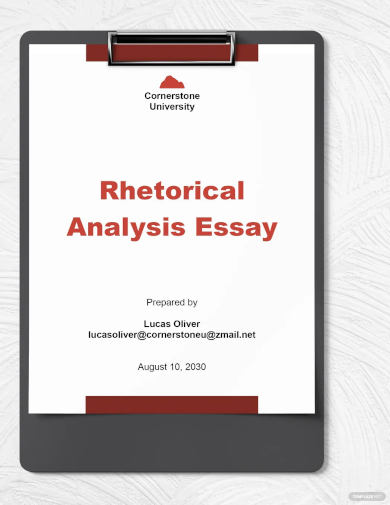
2. Critical Rhetorical Analysis Example
3. Rhetorical Questions Example
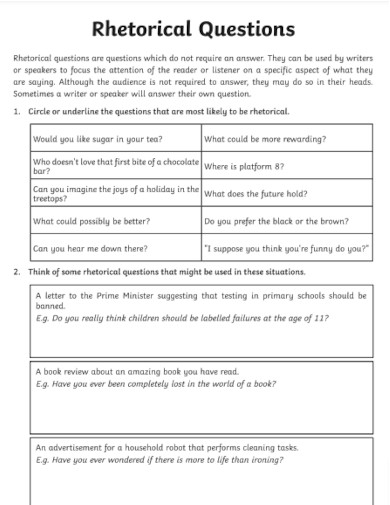
st-annes-pri.manchester.sch.uk
4. Rhetorical Essay Layout Example
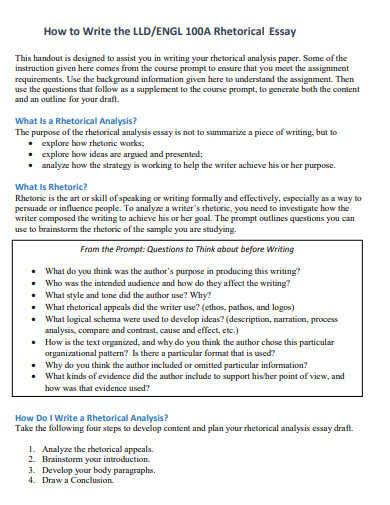
sjsu.edu
5. Rhetorical Analysis Thesis Statement Example
6. Rhetorical Template
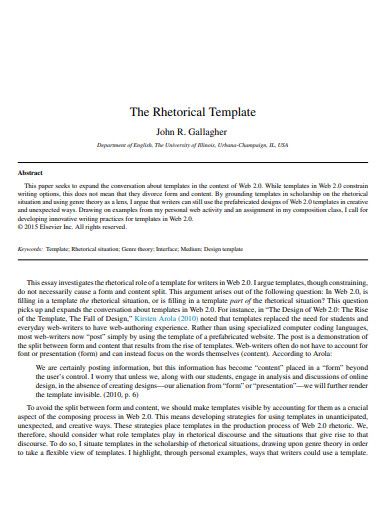
publish.illinois.edu
Rhetorical Purpose
To Inform
- The primary goal is to provide information or explain something.
- Examples: Textbooks, news articles, reports.
- Techniques: Clear and concise language, factual evidence, logical structure.
To Persuade
- The aim is to convince the audience to accept a certain viewpoint or take specific action.
- Examples: Advertisements, opinion columns, political speeches.
- Techniques: Emotional appeals, strong arguments, rhetorical questions, repetition.
To Entertain
- The main objective is to amuse or engage the audience.
- Examples: Novels, short stories, comedic performances.
- Techniques: Humor, vivid descriptions, engaging plotlines, relatable characters.
To Express
- The purpose is to convey thoughts, feelings, or experiences.
- Examples: Personal essays, diaries, memoirs.
- Techniques: First-person narrative, descriptive language, emotional tone.
Elements of Rhetoric
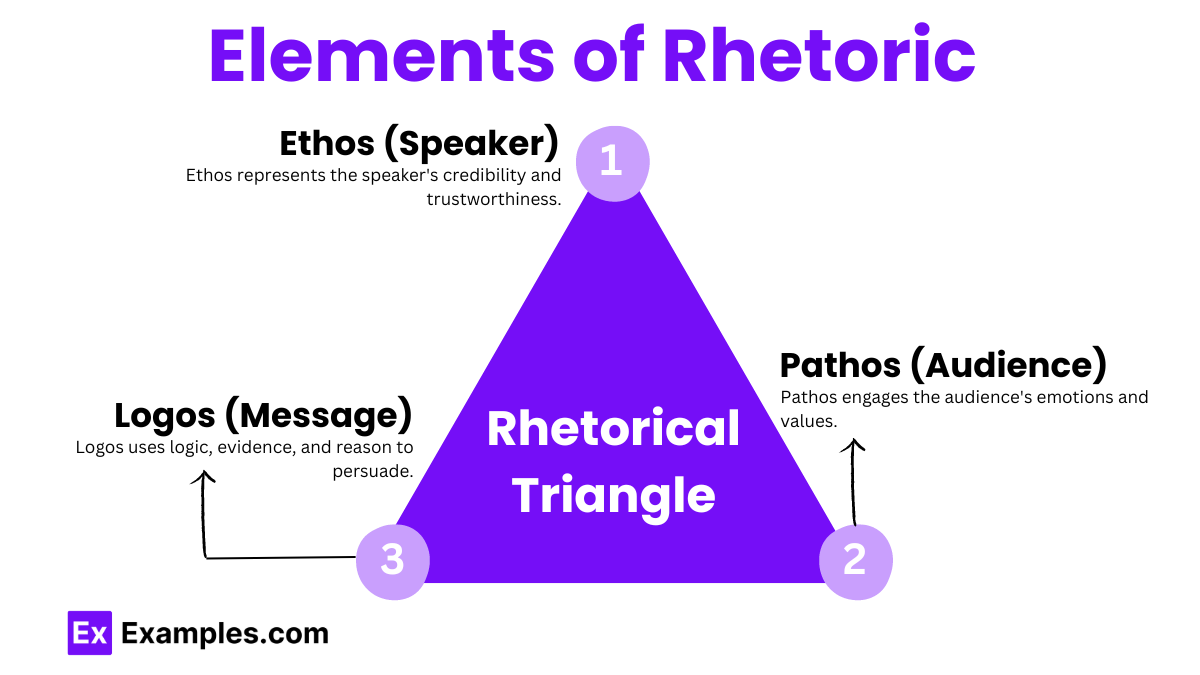
Rhetoric is the art of persuasion and effective communication. It involves several key elements that work together to influence an audience. Understanding these elements helps in crafting compelling messages and analyzing persuasive texts. The primary elements of rhetoric include the rhetorical situation, the appeals (ethos, pathos, logos), and the rhetorical devices.
1. Rhetorical Situation
The rhetorical situation refers to the context in which communication takes place. It includes the following components:
- Speaker (Rhetor): The individual or group delivering the message.
- Audience: The intended recipients of the message.
- Purpose: The goal or objective of the message.
- Context: The circumstances surrounding the communication, including the time, place, and current events.
- Message: The content of the communication.
2. Rhetorical Appeals
Rhetorical appeals are strategies used to persuade an audience. They include ethos, pathos, and logos:
Ethos (Ethical Appeal)
Ethos establishes the credibility and authority of the speaker. It relies on the speaker’s character and expertise to gain the audience’s trust.
- Techniques: Citing credentials, demonstrating expertise, establishing common ground with the audience.
Pathos (Emotional Appeal)
Pathos appeals to the audience’s emotions. It aims to evoke feelings such as empathy, anger, or happiness to persuade the audience.
- Techniques: Using vivid imagery, telling personal stories, appealing to values and beliefs.
Logos (Logical Appeal)
Logos relies on logic and reason. It uses evidence, facts, and logical arguments to convince the audience.
- Techniques: Providing statistics, citing research, constructing logical arguments.
3. Rhetorical Devices
Rhetorical devices are techniques used to enhance the effectiveness of communication. They help emphasize points, create memorable statements, and engage the audience.
Common Rhetorical Devices
- Anaphora: Repetition of a word or phrase at the beginning of successive clauses or sentences.
- Example: “We shall fight on the beaches, we shall fight on the landing grounds, we shall fight in the fields.”
- Alliteration: Repetition of the initial consonant sounds in a series of words.
- Example: “Peter Piper picked a peck of pickled peppers.”
- Antithesis: Contrasting ideas are presented in a parallel structure.
- Example: “It was the best of times, it was the worst of times.”
- Metaphor: A comparison between two unlike things without using “like” or “as.”
- Example: “Time is a thief.”
- Simile: A comparison between two unlike things using “like” or “as.”
- Example: “Her smile was as bright as the sun.”
- Hyperbole: Exaggeration for emphasis or effect.
- Example: “I’m so hungry I could eat a horse.”
- Rhetorical Question: A question asked for effect, not meant to be answered.
- Example: “Isn’t it a bit too much to expect?”
- Parallelism: Use of similar grammatical structures in successive phrases or sentences.
- Example: “She likes cooking, jogging, and reading.”
Rhetoric Techniques
Rhetoric techniques are strategies used to enhance the persuasiveness and impact of communication. These techniques help to engage the audience, emphasize key points, and convey messages more effectively. Here are some essential rhetoric techniques:
1. Anaphora
Anaphora involves the repetition of a word or phrase at the beginning of successive clauses or sentences.
- Example: “We shall fight on the beaches, we shall fight on the landing grounds, we shall fight in the fields.”
2. Alliteration
Alliteration is the repetition of the initial consonant sounds in a series of words.
- Example: “Peter Piper picked a peck of pickled peppers.”
3. Antithesis
Antithesis presents contrasting ideas in a parallel structure to highlight their differences.
- Example: “It was the best of times, it was the worst of times.”
4. Metaphor
A metaphor makes a comparison between two unlike things by stating that one thing is another.
- Example: “Time is a thief.”
5. Simile
A simile compares two unlike things using “like” or “as.”
- Example: “Her smile was as bright as the sun.”
6. Hyperbole
Hyperbole involves exaggeration for emphasis or effect.
- Example: “I’m so hungry I could eat a horse.”
7. Rhetorical Question
A rhetorical question is asked for effect rather than to elicit an answer.
- Example: “Isn’t it a bit too much to expect?”
8. Parallelism
Parallelism uses similar grammatical structures in successive phrases or sentences to create a sense of rhythm and balance.
- Example: “She likes cooking, jogging, and reading.”
9. Ethos
Ethos establishes the credibility and authority of the speaker to gain the audience’s trust.
- Techniques: Citing credentials, demonstrating expertise, establishing common ground.
10. Pathos
Pathos appeals to the audience’s emotions to evoke feelings that support the speaker’s argument.
- Techniques: Using vivid imagery, telling personal stories, appealing to values and beliefs.
11. Logos
Logos relies on logic and reason, using evidence and logical arguments to persuade the audience.
- Techniques: Providing statistics, citing research, constructing logical arguments.
12. Anecdote
An anecdote is a short, personal story used to illustrate a point or connect with the audience.
- Example: Sharing a personal experience related to the topic at hand.
13. Repetition
Repetition involves repeating words or phrases to emphasize a point and make it more memorable.
- Example: “Let it snow, let it snow, let it snow.”
14. Imagery
Imagery uses descriptive language to create vivid mental pictures for the audience.
- Example: “The golden sunset painted the sky with hues of orange and pink.”
15. Analogy
An analogy compares two different things to highlight some form of similarity.
- Example: “Just as a sword is the weapon of a warrior, a pen is the weapon of a writer.”
16. Irony
Irony involves saying one thing but meaning another, often for humorous or emphatic effect.
- Example: Describing a disastrous situation as “a fine mess.”
17. Asyndeton
Asyndeton is the omission of conjunctions between parts of a sentence to create a concise, impactful statement.
- Example: “I came, I saw, I conquered.”
18. Polysyndeton
Polysyndeton uses multiple conjunctions between parts of a sentence to slow down the pace and add emphasis.
- Example: “We have ships and men and money and stores.”
19. Understatement
Understatement makes a situation seem less important or serious than it is for rhetorical effect.
- Example: Describing a major disaster as “a bit of a problem.”
20. Allusion
Allusion is a reference to a well-known person, place, event, or work of art to make a point.
- Example: “This place is like a Garden of Eden.”
Rhetoric Theory
Rhetoric theory examines the principles and strategies of effective communication, focusing on how speakers and writers persuade and influence their audience. It has roots in ancient philosophy and has evolved over centuries, influencing fields such as literature, politics, and communication studies. Understanding rhetoric theory involves exploring its historical context, key concepts, and major theorists.
Historical Context
Ancient Greece
Rhetoric theory originated in Ancient Greece, where it was a crucial part of education and public life. Notable figures include:
- Aristotle: Defined rhetoric as the art of discovering all available means of persuasion. He introduced the three rhetorical appeals: ethos, pathos, and logos.
- Plato: Criticized rhetoric for its potential to deceive but acknowledged its power in shaping public opinion.
- Sophists: Traveling teachers who emphasized the power of persuasive language, often prioritizing effectiveness over truth.
Roman Contributions
The Romans expanded on Greek rhetoric, with significant contributions from:
- Cicero: Emphasized the importance of the orator’s moral character and introduced the five canons of rhetoric: invention, arrangement, style, memory, and delivery.
- Quintilian: Focused on the ethical responsibilities of the orator and the importance of a well-rounded education.
Key Concepts
Rhetorical Appeals
- Ethos: Establishes the speaker’s credibility and trustworthiness.
- Pathos: Appeals to the audience’s emotions.
- Logos: Uses logic and reason to persuade.
The Five Canons of Rhetoric
- Invention: Finding arguments and evidence to support the message.
- Arrangement: Organizing the arguments for maximum impact.
- Style: Choosing the right language and tone.
- Memory: Mastering the material for effective delivery.
- Delivery: Presenting the message with appropriate gestures, voice, and timing.
Rhetorical Situations
- Exigence: The issue or problem that prompts the need for communication.
- Audience: The group of people the speaker aims to influence.
- Constraints: Factors that limit or shape the communication, such as cultural norms or audience expectations.
Major Theorists
Aristotle
Aristotle’s work “Rhetoric” remains foundational, introducing the three appeals (ethos, pathos, logos) and emphasizing the importance of context in effective persuasion.
Kenneth Burke
A 20th-century theorist, Burke introduced the concept of identification, where the speaker aligns themselves with the audience’s values and beliefs. He also developed the dramatistic pentad to analyze motives in communication: act, scene, agent, agency, and purpose.
Stephen Toulmin
Toulmin focused on the structure of arguments, introducing the Toulmin Model, which includes six components: claim, data, warrant, backing, qualifier, and rebuttal.
Chaim Perelman
Perelman, along with Lucie Olbrechts-Tyteca, developed the New Rhetoric, which emphasized the role of audience and the importance of argumentation in everyday discourse. They introduced concepts like the universal audience and the dissociation of concepts.
Rhetoric vs. Rhetorical
| Aspect | Rhetoric | Rhetorical |
|---|---|---|
| Definition | The art of persuasive speaking or writing. | Relating to or concerned with rhetoric. |
| Usage | Noun | Adjective |
| Focus | Broad concept involving strategies and techniques of persuasion. | Specific characteristics or qualities related to rhetoric. |
| Examples in Sentences | “The politician’s rhetoric was very convincing.” | “She asked a rhetorical question to make a point.” |
| Scope | Encompasses all methods and techniques used to persuade or inform. | Describes something that pertains to or is characteristic of rhetoric. |
| Application | Studied as a discipline in literature, communication, and politics. | Used to describe questions, devices, or situations that relate to rhetoric. |
| Etymology | Derived from the Greek word “rhetorike,” meaning the art of oratory. | Derived from the Greek word “rhetorikos,” meaning skilled in speaking. |
| Common Phrases | “Political rhetoric,” “persuasive rhetoric,” “rhetoric of war.” | “Rhetorical question,” “rhetorical device,” “rhetorical strategy.” |
| Connotation | Can be neutral or negative, often associated with insincere or exaggerated speech. | Usually neutral, describing something related to the techniques of rhetoric. |
| Purpose | To analyze or describe the overall use and study of persuasive communication. | To specify the particular elements or features of rhetoric in use. |
Synonym & Antonyms of Rhetoric
Understanding the synonyms and antonyms of the word “rhetoric” can help in comprehending its usage and finding suitable alternatives in different contexts.
Synonyms of Rhetoric
- Oratory: The art of public speaking, especially in a formal and eloquent manner.
- Elocution: The skill of clear and expressive speech, particularly of distinct pronunciation and articulation.
- Discourse: Written or spoken communication or debate.
- Persuasion: The act of convincing someone to do or believe something.
- Argumentation: The process of developing or presenting an argument; reasoning.
- Speech: The expression of or the ability to express thoughts and feelings by articulate sounds.
- Verbiage: Excessive use of words, especially of technical or obscure terms.
- Bombast: High-sounding language with little meaning, used to impress people.
- Grandiloquence: Pompous or extravagant in language, style, or manner, especially in a way that is intended to impress.
- Eloquence: Fluent or persuasive speaking or writing.
Antonyms of Rhetoric
- Silence: The absence of sound or speech.
- Conciseness: The quality of being brief and to the point.
- Brevity: Concise and exact use of words in writing or speech.
- Plainness: Lack of ornament or pretentiousness; straightforwardness.
- Simplicity: The quality or condition of being easy to understand or do.
- Inarticulateness: The inability to express one’s ideas or feelings clearly in speech or writing.
- Muteness: The quality of being unable to speak.
- Taciturnity: The state or quality of being reserved or reticent in conversation.
- Wordlessness: The state of being without words; unspoken communication.
- Understatement: The presentation of something as being smaller or less good or important than it actually is.
How is Rhetoric Used in Writing
Rhetoric enhances writing by making it more persuasive and engaging. Here’s how it is used:
1. Establishing Ethos (Credibility)
- Expertise: Mentioning qualifications or experiences.
- Example: “As a doctor with 20 years of experience…”
- Credible Sources: Referencing authoritative sources.
- Example: “According to a study published in the Journal of Medicine…”
- Professional Tone: Using formal language.
2. Appealing to Pathos (Emotion)
- Personal Stories: Sharing relatable anecdotes.
- Example: “I will never forget the day my hometown was hit by the storm…”
- Vivid Imagery: Creating mental pictures.
- Example: “The children’s faces lit up with joy…”
- Values and Beliefs: Aligning with the audience’s values.
- Example: “Every child deserves a chance to succeed…”
3. Utilizing Logos (Logic)
- Facts and Data: Using statistics and research.
- Example: “Studies show regular exercise reduces heart disease risk by 30%…”
- Logical Arguments: Developing clear, reasoned points.
- Example: “Investing in renewable energy can reduce our carbon footprint and save money…”
- Analogies and Examples: Drawing useful comparisons.
- Example: “A strong foundation is essential for a house, just as a good education is crucial for success…”
4. Employing Rhetorical Devices
- Anaphora: Repetition at the beginning of clauses.
- Example: “We will fight for justice, we will fight for equality…”
- Metaphor and Simile: Comparing two unlike things.
- Example: “Her smile was a ray of sunshine…”
- Hyperbole: Exaggerating for emphasis.
- Example: “I’ve told you a million times…”
- Rhetorical Questions: Asking for effect, not answers.
- Example: “Isn’t it time we took action?”
5. Structuring the Argument
- Classical Structure:
- Introduction: Present the issue.
- Narration: Provide background.
- Confirmation: Support arguments.
- Refutation: Counter opposing arguments.
- Conclusion: Summarize and call to action.
- Toulmin Model:
- Claim: The main argument.
- Data: Supporting evidence.
- Warrant: Reasoning connecting data to claim.
- Backing: Additional support.
- Qualifier: Strength of the claim.
- Rebuttal: Address counterarguments.
6. Creating a Persuasive Tone
- Confident Voice: Being clear and assertive.
- Example: “There is no doubt that…”
- Balance Emotion and Reason: Combining pathos and logos.
- Example: “Statistics show the trend, and personal stories highlight the impact…”
- Engaging the Audience: Directly involving readers.
- Example: “Imagine a world where…”
How to Use Rhetoric
Before we delve into the steps, it’s important to understand that using rhetoric effectively requires a keen understanding of your audience, your message, and the best way to bridge the two.
Step 1: Understand Your Audience
The first step in using rhetoric effectively is understanding your audience. This involves knowing their beliefs, values, and expectations. This understanding will guide your choice of rhetorical devices and the tone of your language.
Step 2: Define Your Message
Once you have a clear understanding of your audience, the next step is to define your message. This could be an argument you want to make, a point you want to get across, or a feeling you want to evoke. For instance, in a comparative analysis essay, your message might be the similarities or differences between two subjects.
Step 3: Choose Your Rhetorical Devices
After defining your message, choose the rhetorical devices that will best convey it. These could include rhetorical questions, which provoke thought rather than seeking answers, or analogies, which draw comparisons to make complex ideas more understandable. Alliteration, a literary device that involves the repetition of initial consonant sounds, can also be used for emphasis or to create a memorable phrase.
Step 4: Construct Your Argument
With your audience, message,ng your main points, providing supporting evidence, and addressing any potential counterarguments. Be wary of logical fallacies, which can undermine your argument’s credibility.
Step 5: Craft Your Conclusion
The final step is to craft your conclusion. An effective essay conclusion should not merely restate your argument but also provide a sense of closure and leave a lasting impression on your audience. This is where your rhetorical skills can truly shine, as you tie together your points and leave your audience with something to ponder.
What is rhetoric?
Rhetoric is the art of persuasion using language effectively in speaking or writing to influence an audience’s beliefs, attitudes, or actions.
Why is rhetoric important?
Rhetoric is important because it helps individuals communicate persuasively, understand and analyze arguments, and influence public opinion or behavior.
What are the main components of rhetoric?
The main components of rhetoric are ethos (credibility), pathos (emotion), and logos (logic), which work together to persuade and engage an audience.
How is ethos used in rhetoric?
Ethos establishes the speaker’s or writer’s credibility and trustworthiness, often through expertise, authority, or ethical appeal, to gain the audience’s confidence.
How does pathos function in rhetoric?
Pathos appeals to the audience’s emotions, aiming to evoke feelings such as empathy, anger, or joy to persuade and connect with them on an emotional level.
What role does logos play in rhetoric?
Logos uses logical reasoning, facts, and evidence to support an argument, appealing to the audience’s rationality and intellect to persuade them.
Can you give an example of a rhetorical device?
An example of a rhetorical device is a metaphor, which compares two unlike things without using “like” or “as,” adding depth and understanding to the message.
What is the purpose of a rhetorical question?
A rhetorical question is asked for effect, not requiring an answer, to provoke thought, emphasize a point, or persuade the audience.v
How is rhetoric used in everyday life?
Rhetoric is used in everyday life to persuade, inform, and engage in conversations, advertisements, social media, and public speaking.
What are the five canons of rhetoric?
The five canons of rhetoric are invention, arrangement, style, memory, and delivery, which are essential steps in crafting effective persuasive communication.



